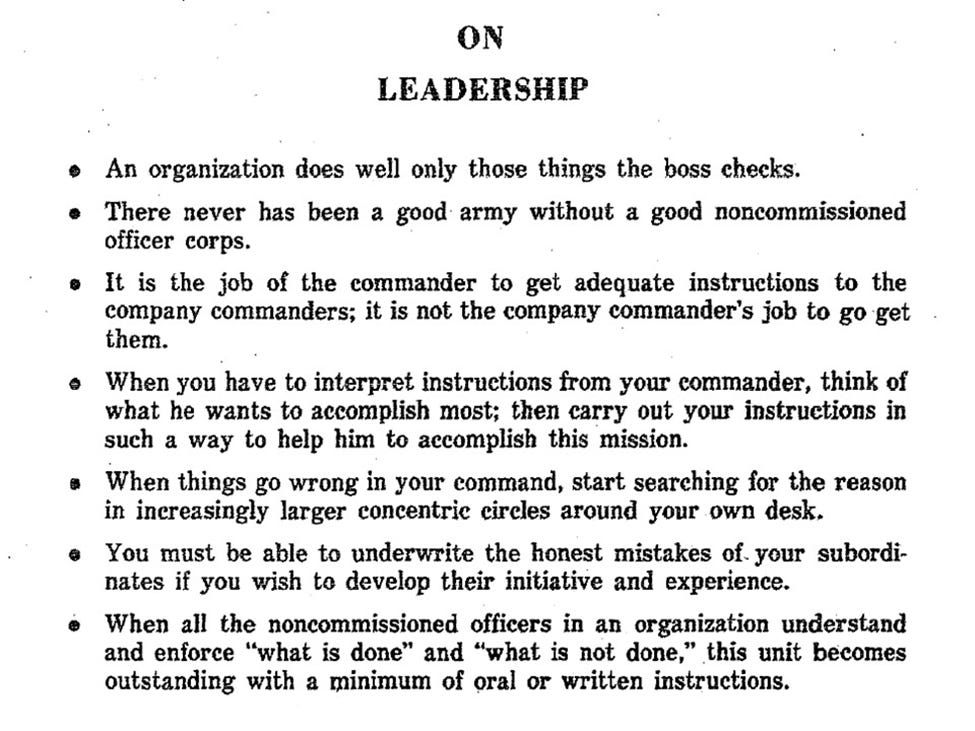Thoughts on Leadership from WWII
GEN Bruce C. Clarke’s pamphlet on what makes (and breaks) an Army leader
Harding Project Readers:
Thank you for reading my last post on CSM (ret) Ted Arthurs’ advice to the West Point Class of 1969. Here is another old document from my archives that has many equally timeless thoughts on leadership.
This post is about a pamphlet titled “Thoughts on Leadership” by GEN Bruce C. Clarke. GEN Clarke should be well-known to many of you from your study of the US Army during WW2.
He is one of few US Army generals who started his Army career as a private. He victoriously commanded Combat Command A, 4th Armored Division, at the Battle of Arracourt, France, in September 1944; and then was transferred to command Combat Command B, 7th Armored Division where he led it in the delaying action at St. Vith, Belgium, holding up the German Ardennes Offensive for a week when tasked to hold for three days. His last assignment was a Commander-in-Chief of US Army Europe before retiring in 1962. This link is to a biographical article from THE ARMY HISTORICAL FOUNDATION.
Photo of GEN Bruce Clarke.
One of my leaders shared this with me when I was a 2LT at the Infantry Officers’ Basic Course (IOBC) at Ft. Benning. The original pamphlet is 28 pages long, and was published by the Engineer School Bulletin but I cannot determine the exact date from the 1970’s. With a little bit of online research, I discovered that there are two hard copies in the GEN Bruce C. Clarke Library at the Engineer School at Ft. Leonard Wood. The copy I have is a 16-page extract from this pamphlet (embedded below at the end of this article). Before I wrote this post, I obtained permission from GEN Clarke’s grandson to write about the pamphlet.
This pamphlet is another of those formative documents that my instructors and leaders shared with me their efforts to develop me as an officer and leader. What is also remarkable about GEN Clarke is that, even after he retired, he continued to work to improve the Army, develop leaders, speak at leadership school graduations, and write articles in the service journals and newspapers until his death in 1988.
From the first page of the pamphlet, he pulls no punches as he writes about his key thoughts on leadership. I was especially taken by the second and fifth bullets below:
· “There never has been a good army without a good noncommissioned officer corps.”
· “When things go wrong in your command, start searching for the reason in increasingly larger concentric circles around your own desk.”
Throughout the remainder of the pamphlet, he discusses leadership coaching, professionalism, morale, motivation, what Soldiers have a right to expect from their leaders, what battalion and company commanders have a right to expect from higher commanders and their staffs, producing outstanding units, and other related topics.
Here are two quotations I carried with me throughout my career that focus on the training and development of Soldiers and leaders:
“We cannot produce outstanding units from the ordinary run of personnel whom we enlist under the Modern Volunteer Army concept unless we train, coach, and develop our squad leaders, platoon sergeants, and platoon leaders to look after their men in their units and mold them into proud and winning teams under the direction of good commandership from above.”
“I have heard it said that we violate the chain of command because the NCO’s and officers at the company level are not adequately trained or experienced. Who is to blame for that? Certainly, not these NCO’s and young officers! They need adequate training and coaching the same as commanders and staffs above them do when first assigned.”
I hope you take the time to read the whole pamphlet. Thank you and enjoy reading!
Barrett F. Lowe
COL, USA (ret)
Please checkout the embedded file below!





Thank you for this. I just assumed BN command in the USAR. Two things stick out:
1) My initial priority was to coach, mentor, and train the PLs and the COs. What I know about training management, leadership, admin, etc. was learned either through experience or by someone. I am now that someone.
2) my priority did not align with the CG’s. I found this out intimately during the QTB. Lesson learned. The boss’ priority becomes my #1. My priority becomes my #1a.
Good article, and a timely reminder of Gen. Clarke's influence. Known as the "Sergeants General," he is credited as creating the modern NCO Academy during his tenure with the Constabulary in Post WWII Germany. He was a prolific speaker and writer, he has boxes of his papers and correspondence, both in and out of uniform, at the Army Heritage Center. He continued to support the NCO Academy concept until the Army Implemented NCO Education System advising Army Chiefs of Staff and TRADOC CGs until later in his life. Thanks for the reminder of Gen. Clarke and his influence.